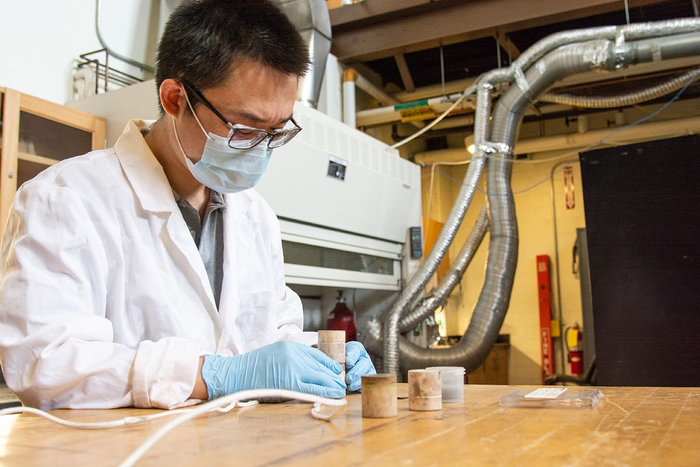Researchers at West Virginia University are vying to overcome the final hurdle in connecting renewable energy to the power grid by “greenifying” the production of hydrogen.

Credit: WVU Photo/Paige Nesbit
Researchers at West Virginia University are vying to overcome the final hurdle in connecting renewable energy to the power grid by “greenifying” the production of hydrogen.
“We have a really good source of renewables and a huge market for hydrogen, but the barrier is that we cannot connect them,” said Wenyuan Li, assistant professor of chemical and biomedical engineering and principal investigator of the project. “Our technology is like a bridge in the middle. You take electricity from renewables and transform them into hydrogen.”
Li, alongside Xingbo Liu, interim associate dean for research and professor of mechanical and aerospace engineering, and Edward Sabolsky, professor of mechanical and aerospace engineering in the Statler College, have been awarded $1.2 million in funding from the United States Department of Energy to overcome the barriers associated with the production of green hydrogen as part of the DOE’s $16.5 million effort to help recalibrate the nation’s vast fossil fuel and power infrastructure for decarbonized energy and commodity production.
“Green hydrogen means that along the whole process of producing hydrogen, there is no carbon emission or carbon footprint,” Li explained. “There is a big market for this type of technology.”
The researchers will use a solid oxide electrolysis cell, a device that uses electricity to split water into hydrogen and oxygen to generate green, high purity hydrogen. The hydrogen can then be used for a number of industrial applications, including the manufacturing of advanced computer chips, solar cells, metals refinement and fertilizer production.
The hydrogen can also be used as a cost-effective energy carrier to store large-scale, excess energy from renewables such as solar and wind, and power fuel cells to generate electricity for the power grid or other applications.
According to Li, solid oxide electrolysis and fuel cells are being looked at to reshape how the world is powered. The impact could be seen in lower energy bills, hydrogen-powered heavy-duty vehicles like semi-trucks and ships and in the health of the environment.
“We can use hydrogen to generate power or to power electric vehicles,” Li said. “When you charge an electric vehicle, this energy comes from a fossil fuel-fired power plant and is expensive and also generates carbon emissions. But an electric vehicle using hydrogen coming from our technology is green and cheap.”
As the world moves towards a clean energy future, interest in producing green hydrogen for industrial purposes has skyrocketed around the world. If successful, the new method will produce hydrogen from water, instead of fossil fuels, to reduce carbon emissions of industrial hydrogen.
If the researchers can overcome the challenge of the materials’ susceptibility to chromium poisoning, solid oxide electrolysis cells will finally reach commercialization. Li explained that chromium causes the device to degrade quickly, prohibiting it from being used over a long period of time.
The researchers are working alongside Worcester Polytechnic Institute to provide the market with chromium-resistant electrode materials to be used for electrolysis cell technology.
According to the International Energy Agency, the global demand for hydrogen for use as a fuel has tripled since 1975 and reached 70 million tonnes a year in 2018.




